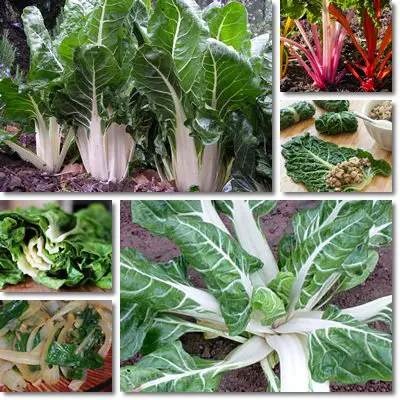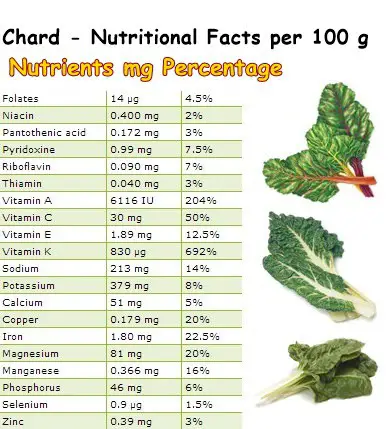A green leafy vegetable of outstanding nutritional value, chard (Beta vulgaris cicla) boasts several rather impressive health benefits. Not only does it promote bone integrity and helps prevent osteoporosis, but it also reduces inflammation levels, supports blood coagulation and offers antioxidant protection to prevent chronic disease.
Moreover, chard is excellent for eyesight, promoting vision acuity, a good food for skin health and strengthens the immune system at the same time. If eaten raw or juiced, it supplies important amounts of vitamin C with antioxidant and anti-inflammatory benefits.
The vegetable’s generous iron content helps prevent anemia, while its excellent vitamin K content helps prevent arterial calcification and atherosclerosis. Copper and vitamin E boast great anti-aging properties, while vitamin A supports the immune system and good vision. Lastly, the vegetable has a relatively high vitamin C content which further contributes to its anti-inflammatory properties. Overall, chard is an ideal choice for a genuinely healthy diet.

What does chard look like?
Chard is a green leafy vegetable of European origin. It has broad, deep green or reddish, meaty leaves with either green, rhubarb-red, yellowish or white thick stalks. Because of its extensive use in both European cuisine, especially Mediterranean, and American cuisine, it has been blessed with many names including Swiss chard, mangold, spinach beet, seakale and so on.
Overall, it looks like any green leaf vegetables, with distinctive broad, meaty leaves and thick, crisp stems. Cooked chard leaves become soft and slightly mushy, similar to spinach. The stalks and leaf ribs preserve their texture and shape and are similar to cooked asparagus.
What does chard taste like?
Chard has a unique, slightly earthy, green vegetable taste, reminiscent of spinach and beet greens, to which it is actually related, hence the names silverbeet or spinach beet. It is low in calories (only 19 kcal/100 g) and thus very figure-friendly. Newer, more tender leaves are tender and lack the trademark bitterness of mature leaves so you can enjoy them fresh in a salad alongside cucumbers, radishes, onions or olives and feta. Mature leaves are meaty, crisp and very bitter and so are the stalks. Also see benefits of beet greens.
How to eat chard
It is recommended to cook the stalks first for several minutes and then add the leaves so they are ready at the same time (chard stalks are thick and will take longer to cook than the leaves). If you find the vegetable too bitter, you can always cut out the stalks and large veins and keep the rest of the leaf. Surprisingly, chard tastes great stuffed with meat and baked or steamed with a bit of butter, garlic and a pinch of salt and pepper.

However, just like spinach and most greens, raw chard contains oxalic acid, a natural compound that may prove toxic if ingested in large amounts. Oxalic acid may cause kidney failure if more than 15-20 g are ingested. Fortunately, no normal, balanced diet can provide that much of the anti-nutrient. The risks are higher for people already suffering from kidney problems, especially kidney failure. However, cooking the leaves and stems for at least several minutes destroys the oxalic acid and cancels out its side effects.
What are the benefits of eating chard?
What is chard good for? Find out below what are the top 7 health benefits of chard:
Good for eyesight
With 204% of the RDA of vitamin A, chard is excellent for maintaining good eyesight. A more severe vitamin A deficiency can lead to impaired vision and night blindness. Chard is also rich in alpha-carotene, beta-carotene, lutein and zeaxanthin, powerful antioxidants which our body partially converts into vitamin A. Lutein and zeaxanthin, for example, physically complete the macula lutea area and the retina, protecting against free radicals from (blue) light and preventing macular degeneration (loss of central vision).
Boosts immunity
The high amounts of vitamins A and C in chard make it an excellent immune boosting food. Vitamin C is an extremely potent antiviral and antibacterial agent, known to reduce inflammation and increase white blood cell aggressiveness, thus contributing to good immunity.
Vitamin A protects the integrity of mucous membranes such as those lining the inside of the nose, mouth, throat, lungs and digestive tract, the areas directly exposed bacteria and other pathogens. Having sufficient amounts of vitamin A in one’s diet prevents pathogens from causing infection and disease and chard and green leafy vegetables are some of the best sources of the nutrient.

Promotes bone health
Although a poor source of calcium, chard is an absolutely amazing source of vitamin K (692%), a nutrient with extraordinary health benefits. Vitamin K ensures the correct absorption of calcium in bones and teeth, thus contributing to a strong, healthy bone frame. Moreover, due to maintaining hormonal balance, it regulates bone formation processes, preserving bone integrity and preventing bone demineralization, a principal cause of osteoporosis.
Reduced risk of atherosclerosis and cardiovascular disease
Again thanks to its incredible vitamin K content. Because it directs calcium into bones and teeth, vitamin K prevents it from being absorbed elsewhere, such as joints, ligaments, artery walls or heart valves. When a person has a vitamin K deficiency and a high calcium intake, calcium may deposit on artery walls, stiffening them and restricting blood flow. This is known as atherosclerosis and represents a main factor in cardiovascular disease.
Bottom line is: make sure you include vitamin K-rich foods such as chard, spinach, kale and parsley in your diet for health arteries, but consult a doctor first if you have been prescribed anticoagulants because vitamin K also encourage blood coagulation.
Reduces inflammation levels in the body
Chard is rich in natural anti-inflammatory compounds such as vitamins C and K. Research has revealed that high inflammation levels precede chronic illnesses such as cancer, diabetes, obesity, dementia and so on. A healthy intake of naturally grown fruits and vegetables with excellent anti-inflammatory properties should help keep inflammation levels within normal limits and prevent the development of more severe diseases.
Prevents iron deficiency
Chard is a good source of iron, only 100 g providing 22.5% of the RDA. Iron is necessary for the production of red blood cells which transport oxygen to lungs, muscles and tissues, giving us the ‘energy’ to walk, talk, work, eat and do just about anything. A deficiency will manifest itself in the form of fatigue, irritability or headaches and may evolve to more severe symptoms if left untreated.
Anticancer properties
Chard is rich in natural antioxidants and anti-inflammatory agents which protect against free radical damage buildup known as oxidative stress, a main trigger for cancer. Among these are vitamins C and K. A recent study has revealed that high doses of both nutrients (5.000 mg of vitamin C and 50 mg of vitamin K3) can successfully stop the proliferation of prostate cancer cells. These findings are indeed amazing, especially when preliminary results are quite promising. Until final results are published, we can resort to prevention as the best protection method. This means eating foods rich in essential nutrients, vitamins C and K included, is the best strategy.
